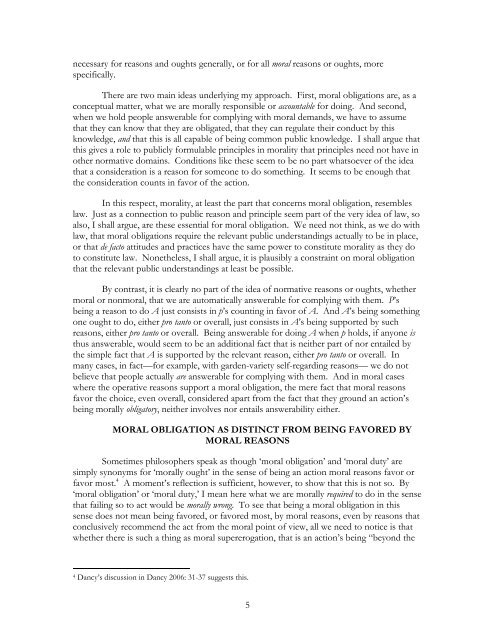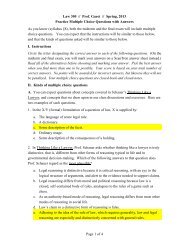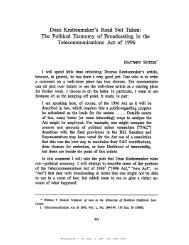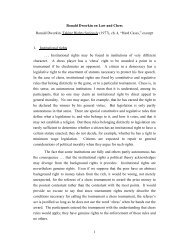generally, in the weight and force of normative reasons, and if principles are not required forthe latter, then why should they be required either for oughts in general or for moral oughtsmore specifically? Even if moral oughts can be d<strong>is</strong>tingu<strong>is</strong>hed from oughts of other kinds bythe content of, or point of view from which we accept, their supporting normative reasons,that wouldn’t d<strong>is</strong>tingu<strong>is</strong>h their normative character, weight, or force. If the normativity ofthe moral ought does not fundamentally from that of other oughts, and if principles areunnecessary for other oughts, then why should they be necessary for moral oughts?My aim in what follows <strong>is</strong> to show that even if one were to concede every bit of<strong>Dancy</strong>’s case for particular<strong>is</strong>m deriving from the theory of reasons, including almost all ofwhat he says about moral reasons and the moral ought, there would nonetheless remain asubstantial case for general<strong>is</strong>m left standing that would have to be considered beforeparticular<strong>is</strong>m about morality could be establ<strong>is</strong>hed. 2 I shall argue, first, that <strong>Dancy</strong>’sarguments leave untouched a powerful rationale for thinking, as Scanlon says, that principleshave a “significant role” to play in morality. And second, I shall try to sketch that rationale,at least in broad outline. My conclusion will be that there <strong>is</strong> an important and prom<strong>is</strong>ing lineof thought leading to moral general<strong>is</strong>m that <strong>Dancy</strong> has failed to consider.For purposes of my argument, we can simply stipulate that normative particular<strong>is</strong>m andpractical particular<strong>is</strong>m are both true. So I shall assume that neither normative thought andjudgment in general, nor thought about normative reasons for acting and so practical oughtsmore specifically, depend, respectively, upon normative principles in general or uponnormative principles of action more specifically. And we can also stipulate that there <strong>is</strong> a senseof the moral ‘ought’, the one I take <strong>Dancy</strong> to have in mind, that may not require principleseither. 3 Th<strong>is</strong> <strong>is</strong> the sense I mentioned before, namely, the one in which to say that someonemorally ought to do something <strong>is</strong> to say that that action <strong>is</strong> supported by moral reasons, eitherpro tanto or overall, that <strong>is</strong>, that the action <strong>is</strong> morally choiceworthy in that sense.My contention will be that conceding all of th<strong>is</strong> does not yet touch anything a moralgeneral<strong>is</strong>t should be, or, I think, that moral general<strong>is</strong>ts primarily have been, concerned about.Th<strong>is</strong> <strong>is</strong> because the major rationale for being a general<strong>is</strong>t about morality <strong>is</strong> the thought thatgeneral principles, indeed general principles that can be assumed to be publicly formulableand available, are necessary for moral obligations. The concept of moral obligation has aspecial character that d<strong>is</strong>tingu<strong>is</strong>hes it from that of what moral reasons favor or recommend,either pro tanto or overall. My argument will be that general principles are plausibly thoughtnecessary in order for anything having th<strong>is</strong> special character to ex<strong>is</strong>t, whether or not they are2 I concede that ‘morally ought’ can be understood in terms of the weight of moral reasons, but I shall arguethat moral obligation, moral duty, and moral wrong cannot. My argument will be that the latter have a specialcharacter and that there <strong>is</strong> reason to think that nothing having th<strong>is</strong> character could ex<strong>is</strong>t without there beingrelevant general principles. If, as I shall argue, concepts with th<strong>is</strong> special character, like that of moralobligation, are intrinsic to the concept of morality as we understand it, then moral particular<strong>is</strong>m will follow. Itwill also then be true that general principles are necessary for there to be moral reasons as well, since there canbe no moral reasons without morality; moral obligations are necessary for that, and these cannot ex<strong>is</strong>t withoutgeneral principles. If so, then though I can concede to <strong>Dancy</strong> that general principles might be unnecessary forsome (non-obligating) moral reasons, they will nonetheless be necessary for moral obligations and therefore forthere to be moral oughts and reasons at all.3 That <strong>is</strong>, as per the preceding the note, that its being the case that one morally ought to do P requires a generalprinciple that in such and such circumstances, anyone morally ought to do P.4
necessary for reasons and oughts generally, or for all moral reasons or oughts, morespecifically.There are two main ideas underlying my approach. First, moral obligations are, as aconceptual matter, what we are morally responsible or accountable for doing. And second,when we hold people answerable for complying with moral demands, we have to assumethat they can know that they are obligated, that they can regulate their conduct by th<strong>is</strong>knowledge, and that th<strong>is</strong> <strong>is</strong> all capable of being common public knowledge. I shall argue thatth<strong>is</strong> gives a role to publicly formulable principles in morality that principles need not have inother normative domains. Conditions like these seem to be no part whatsoever of the ideathat a consideration <strong>is</strong> a reason for someone to do something. It seems to be enough thatthe consideration counts in favor of the action.In th<strong>is</strong> respect, morality, at least the part that concerns moral obligation, resembleslaw. Just as a connection to public reason and principle seem part of the very idea of law, soalso, I shall argue, are these essential for moral obligation. We need not think, as we do withlaw, that moral obligations require the relevant public understandings actually to be in place,or that de facto attitudes and practices have the same power to constitute morality as they doto constitute law. Nonetheless, I shall argue, it <strong>is</strong> plausibly a constraint on moral obligationthat the relevant public understandings at least be possible.By contrast, it <strong>is</strong> clearly no part of the idea of normative reasons or oughts, whethermoral or nonmoral, that we are automatically answerable for complying with them. P’sbeing a reason to do A just cons<strong>is</strong>ts in p’s counting in favor of A. And A’s being somethingone ought to do, either pro tanto or overall, just cons<strong>is</strong>ts in A’s being supported by suchreasons, either pro tanto or overall. Being answerable for doing A when p holds, if anyone <strong>is</strong>thus answerable, would seem to be an additional fact that <strong>is</strong> neither part of nor entailed bythe simple fact that A <strong>is</strong> supported by the relevant reason, either pro tanto or overall. Inmany cases, in fact—for example, with garden-variety self-regarding reasons— we do notbelieve that people actually are answerable for complying with them. And in moral caseswhere the operative reasons support a moral obligation, the mere fact that moral reasonsfavor the choice, even overall, considered apart from the fact that they ground an action’sbeing morally obligatory, neither involves nor entails answerability either.MORAL OBLIGATION AS DISTINCT FROM BEING FAVORED BYMORAL REASONSSometimes philosophers speak as though ‘moral obligation’ and ‘moral duty’ aresimply synonyms for ‘morally ought’ in the sense of being an action moral reasons favor orfavor most. 4 A moment’s reflection <strong>is</strong> sufficient, however, to show that th<strong>is</strong> <strong>is</strong> not so. By‘moral obligation’ or ‘moral duty,’ I mean here what we are morally required to do in the sensethat failing so to act would be morally wrong. To see that being a moral obligation in th<strong>is</strong>sense does not mean being favored, or favored most, by moral reasons, even by reasons thatconclusively recommend the act from the moral point of view, all we need to notice <strong>is</strong> thatwhether there <strong>is</strong> such a thing as moral supererogation, that <strong>is</strong> an action’s being “beyond the4 <strong>Dancy</strong>’s d<strong>is</strong>cussion in <strong>Dancy</strong> 2006: 31-37 suggests th<strong>is</strong>.5
















